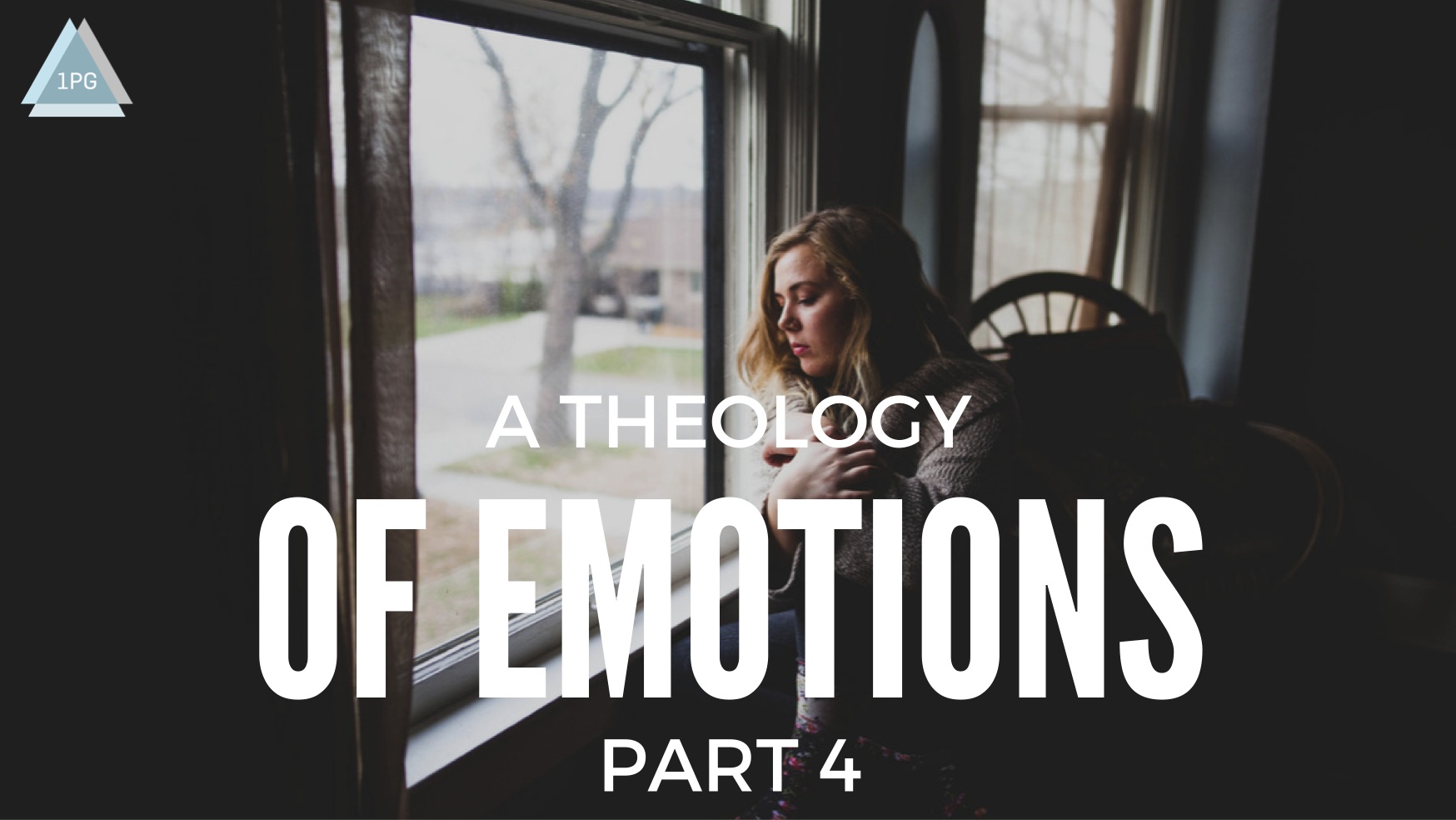A Theology of Emotions, Part 4

"No feeling is final."
-Rainer Maria Rilke
If you know me well, you know how much I love the band U2. If you want to hear me nerd-out to anything, U2 is probably where I get my “nerdiest.” When I was in 5th grade, I heard one of their songs on my sister’s mix tape on the way home from school. I won’t go into the details about how it changed my life at that moment, but I immediately went out and bought the album Pop (well, someone took me to the CD store and bought it for me…).
There are a couple of moments on Pop that Bono writes about intense doubt. The kind of doubt that, as a 5th grader, I could not quite articulate but sensed something very real in it. There are two lines in particular that I remember vividly reading in the liner notes and listening to:
From the song If God Will Send His Angels:
God’s got his phone off the hook,
Would he even pick up if he could?
It’s been a while since we saw that child
Hangin’ round this neighborhood
From Staring at the Sun:
God is good but will he listen?
As an 11-year-old, living in a very black and white world, I remember not knowing how to interact with these moments in the song. My choice (and in my mind, the only reasonable choice to honor my dad who bought me the CD) was to just not sing those lines in the song. If I didn’t sing them, then certainly I did not agree that they could be true. Doubting God? Not me!
I lived out what I think a lot of us in the church have learned to do with feelings. If we can’t make sense of them, just don’t sing the words when they come up in the song. Anger? Not me! Depression? Definitely not me!
Why We Avoid Emotions
We do this for a lot of reasons. For some of you, it might be out of never wanting to feel those feelings. They bring back memories, ushering you back into a moment you wanted to forget. For some of you, it might be the intensity of the emotions deep inside of you, and if you sing those lyrics, it feels like the floodgates will open and you won’t be able to stop the feeling.
I have stressed this simple point ad nauseam the last few months because I know how difficult it is, and how it takes practice: we have first to acknowledge that the emotions are there. I have to acknowledge that I can actually sing those lyrics - I do know that God is good, but sometimes I doubt he hears me. Sometimes I do feel like God has taken his phone off the hook. Sometimes this evokes a sadness in me, a loneliness and fear that I am not valued and loved by God. Sometimes it drives at anger inside of me - if you were hearing me, then why aren’t you doing anything about it! Sometimes it drives shame - if I really believed, I would not question if he hears me.
All of these feelings toss around inside of me and I run to Scripture to confront them. But this confrontation is not bound by a desire to draw closer to God; it is often out of fear and a desire to get those feelings out of me.
What’s the difference?
If I am running to Scripture to further bury/hide/run from my emotions, then I am left with those emotions buried deep within me. I’ve used the Bible to whitewash the tomb of my heart!
Instead, by acknowledging that the emotions are there, I can turn to Scripture with a more honest desire to know God, myself, and others better. There is no longer any pretense of trying to whitewash the emotion to “get rid of it” before approaching God.
As I mentioned previously, our emotions can serve as a gauge for where we are with God, ourselves and others. Once we acknowledge that they are there - “I am feeling upset right now if I’m really being honest with myself” - we can then ask what is going on behind this feeling.
Let’s follow a feeling I sometimes have to see how this can be done:
I often feel anxious. It is an emotion I have felt for a long time, since an early age, but never sought to understand. In retrospect, there were moments in my life where I was on the verge of a panic attack I would feel so anxious, but I would stuff it. It felt like I needed to be stronger...to have more faith...to pray harder and then I wouldn’t feel anxious. The problem was that I would continue to drown in the anxiousness.
This came to a breaking point several years ago when the anxiety got so bad I couldn’t function. I was paralyzed by irrational fears. It was causing problems in my relationships and my work. I went through a process of healing and understanding that helped me move through the anxiety...but I never really got completely rid of it.
So today, let’s say I start to feel anxious about something ambiguous like ‘the future.’ My gut response is to do what I’ve always done to feel better - try to focus on something else (Netflix, working out, youtube videos of people surfing), try to control something around me (my wife, my schedule)...all things that help me push the feeling away and regain some sense of ‘normalcy.’
I might, in an attempt to ‘do it right’ open my Bible and read a passage on how Jesus tells me not to be anxious. I would then spend some time praying away my anxiety, repeating to myself over and over again that what I’m feeling Jesus has told me not to feel, so stop feeling it. Maybe I’m not actively shaming myself, but deep down I’m going to start feeling like a really bad follower of Jesus when in a few days I’m still feeling anxious.
A healthier response and one that I continually still have to actively practice is this:
- Acknowledge, often out loud, that I am feeling anxious. (Sometimes I tell my wife or a close friend that I’m struggling with some severe anxiety).
- Start asking questions about my anxiety - where am I in relation to God, others, and myself right now?
- Typically this reveals that I’m not very close to God...I have probably experienced some break in relationship with someone...and I am caught in a shame loop, constantly telling myself I’m not going to make it or be good enough.
- This might be a good time to explore what has brought me to this point - the distance from God, the distance in my relationship, the willingness to shame myself.
- I can now move into active repentance while searching the Scriptures, bringing my heart into communion with God and bringing understanding to my anxious heart.
This process is never this clean and ordered...it also does not necessarily “solve” my anxiety...but it does allow me to rest. To rest in the knowledge that my feelings are there. It also allows me to rest knowing that my feeling is not final and that I can feel something else. It allows me to begin to work of healing that needs to take place for me to draw closer to God.
We cannot continue to fall into the trap that by simply acknowledging our emotions we will become servants to them or they will get out of control. It is precisely in the practice of acknowledging them that we gain understanding as to why they are there, and how they can better show us what we need.
Next month, I will wrap up this series by focusing on how we do this without indulging our emotions in an unhealthy way, as well as what it looks like to explore what brings us to the point of these emotions.
